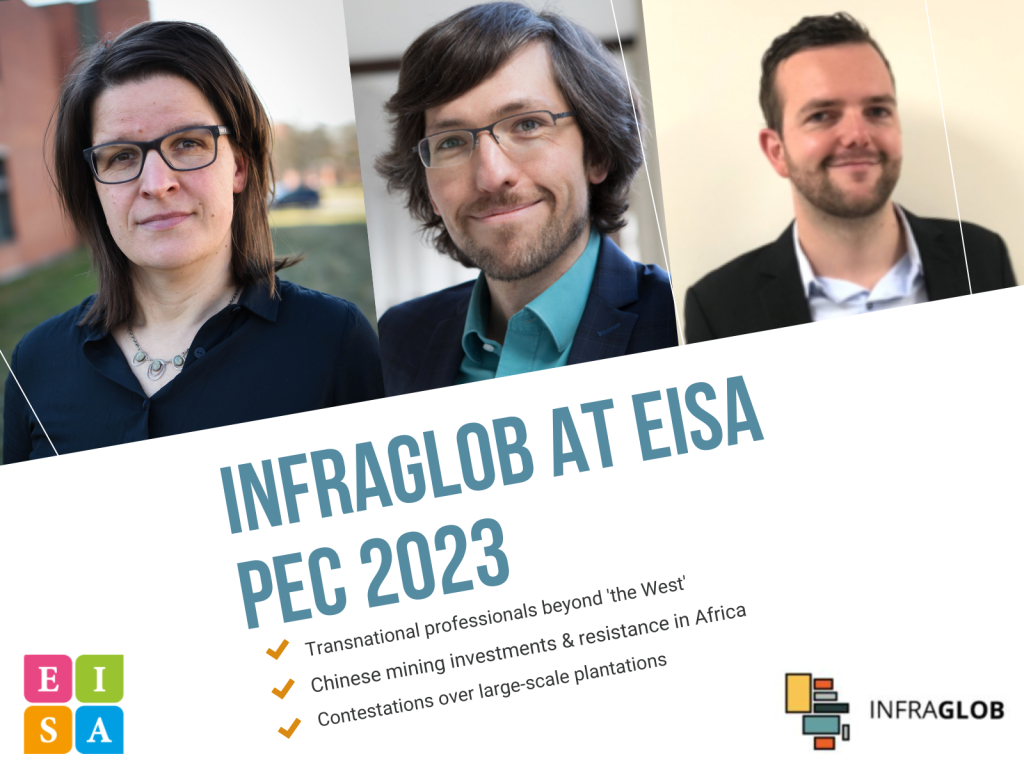
Great news! Our contributions to the 16th EISA Pan-European Conference on International Relations, taking place in Potsdam (5-9 September), have been accepted!
The INFRAGLOB team will participate with the following contributions in the conference:
- Jan Sändig and Jana Hönke will present their paper ‘Going global, meeting resistance, changing practices? Chinese mining investments in Africa’ in the panel ‘Chinese foreign policy and global governance.’
Focusing on struggles over mining investments, they ask how Chinese mining companies become contested and respond to contentious actions. They particularly focus on whether Chinese miners – like their Western peers – respond to protests by employing corporate social responsibility (CSR) practices. The analysis proceeds through case studies of large-scale Chinese mining investment in Guinea and the Democratic Republic of the Congo (DRC). Based on these cases, the paper argues that certain forms of contestation have indeed pushed Chinese mining companies towards CSR endorsement. But it also finds that regulation (both in China and the hosting country) and supply chain pressure for ‘responsible mining’ have mattered. Hence, Chinese actors navigate the global political economy by partly reshaping the international order and partly adapting to established practices.
- Together with Nina Reiners (University of Oslo), Jana Hönke and Raoul Bunskoek convene the panel ‘Transnational Professionals within and beyond ‘the West’: Reshaping Global Governance?’.
The panel will bring together scholars from various sub-fields in International Relations and neighbouring disciplines and thereby provide a platform for interdisciplinary exchange, offering insights into the complexities of the transnational professional experience. Examining the composition, role and impact of transnational professionals in shaping global politics within and beyond the West, the discussions will delve into – among others – the challenges and opportunities faced by transnational professionals as they navigate cultural, political and regulatory boundaries in different contexts.
- Within this panel, Raoul Bunskoek and Jana Hönke will present their paper ‘Party time: Entering the life worlds and career trajectories of Chinese transnational professionals’.
Starting from the observation that Chinese transnational professionals have their own life worlds that do not necessarily correspond to the one suggested in conventional literature, they depart from the conventional approach of researching ‘Western’ transnational professionals. Their paper examines the types of social capital and skill sets required of Chinese transnational professionals; the underlying structures that condition what constitutes competent or successful practice in their case; and how promotions and rewards are distributed. The paper calls for more attention to the diversity of professional life worlds presented in the paper and advances theorizing the effects of such divergence and fragmentation on transnational governance.
- Jan Sändig will present his paper ‘The role of corporation: Explaining why large scale agricultural investments become differently contested’ within the panel ‘Infrastructures and the (Un-)Making of Global Investments.’
With a focus on plantation development in Cameroon, he argues that the role of the investing company has remained underexplored within the literature on resistance against ‘land grabbing.’ He therefore proposes a theoretical framework that draws more widely on research regarding the corporations-contention nexus. The framework integrates insights from this literature into the threats and opportunities perspective from social movement research. To illustrate the argument, he compares two major Cameroonian plantations and their European parent companies. Based on interviews as well as activist and company publications, he finds that differences in corporate actions and their structural traits indeed matter. Thereby, this paper shows the relevance of studying the investing corporations to better understand how large-scale infrastructure development becomes challenged.
To stay up to date, follow us on Twitter: Jana Hönke, Jan Sändig and Raoul Bunskoek. We are looking forward to seeing many of you at the conference and to insightful discussions!

